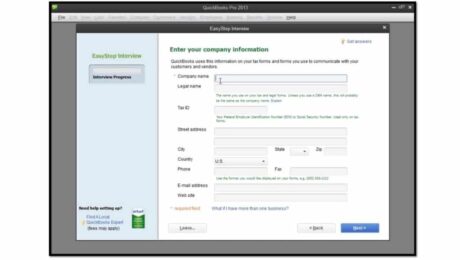Creating Credit Card Accounts in QuickBooks 2014
Thursday, January 09 2014
Creating Credit Card Accounts in QuickBooks 2014: Video This video shows creating Credit Card accounts in QuickBooks 2014. Creating Credit Card Accounts: Overview You should set up a QuickBooks credit card account in the Chart of Accounts for each credit card you use in your business. Like any QuickBooks account, a credit card account has
- Published in Latest, Quickbooks
No Comments
General Ledger Default Settings in Peachtree 2012
Monday, September 16 2013
General Ledger Default Settings in Peachtree 2012: Video This video shows you how to set the General Ledger Default Settings in Peachtree 2012. General Ledger Defaults: Overview The General Ledger records all financial information for your company. Every transaction that occurs is eventually posted to the set of accounts that make up the General Ledger.
Setting Up a Company File in QuickBooks 2013
Thursday, September 05 2013
Setting Up a Company File in QuickBooks 2013: Video This video shows setting up a company file in QuickBooks 2013. Using the Easy Step Interview in QuickBooks 2013: Overview The first thing you should do when using QuickBooks is to set up a company file. If you are new to QuickBooks, you should seriously consider setting
- Published in Latest, Quickbooks
Small Business Accounting- Accounting Basics and Methods
Wednesday, July 24 2013
Understanding accounting is a very useful skill to have when it comes to managing a small business. The better a manager understands financial data, the easier it is for them to make a decision. In this post, we will discuss some basic accounting terms as well as accounting methods that are relevant to small businesses.
- Published in Small Business Accounting
Managerial Accounting- What is a Balance Sheet?
Tuesday, July 02 2013
In accounting, it’s important to understand the different types of financial statements in order to be able to use them properly. The first important financial statement is the balance sheet. A balance sheet is an accounting tool that shows a company’s financial position at a certain point in time. In this post, we will discuss some
- Published in Latest, Small Business Accounting
Managerial Accounting- Overview of Cost Behavior
Wednesday, June 26 2013
Cost behavior analysis is the study of how certain costs behave in a business. Understanding cost behavior is crucial for managers so they can control costs effectively. In this post, we will give a brief overview of cost behavior and the different types of costs a manager can analyze. More information can be found on
- Published in Latest, Small Business Accounting
Small Business Accounting- Debits and Credits
Thursday, June 20 2013
In accounting, T-accounts are used to track economic activity within the business. A T-account is an individual record of an increase/decrease in an asset, liability, stockholder’s equity, revenue, or expense. Each T-account consists of three parts: the title of the account, a debit, and a credit. A debit is the left side of the account.
- Published in Latest, Small Business Accounting






